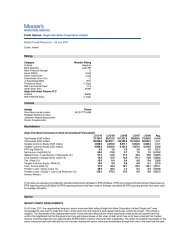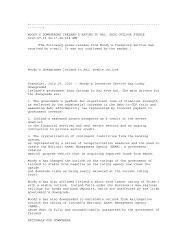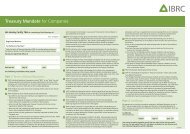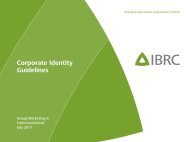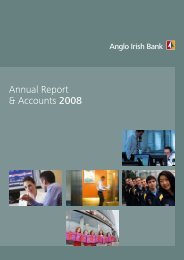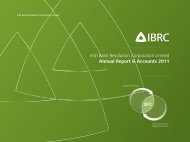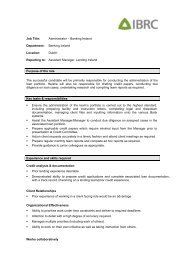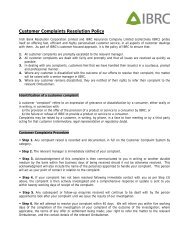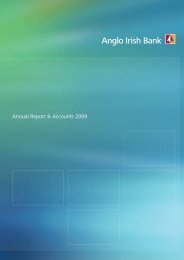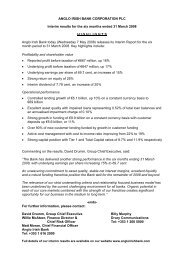IBRC annual report for 2011 - Irish Bank Resolution Corporation ...
IBRC annual report for 2011 - Irish Bank Resolution Corporation ...
IBRC annual report for 2011 - Irish Bank Resolution Corporation ...
Create successful ePaper yourself
Turn your PDF publications into a flip-book with our unique Google optimized e-Paper software.
<strong>Irish</strong> <strong>Bank</strong> <strong>Resolution</strong> <strong>Corporation</strong> LimitedAnnual Report & Accounts <strong>2011</strong>The Credit Policy also:▪ Sets out the process surrounding credit approval;▪ Outlines the manner in which credit risk is managed; and▪ Sets out the context <strong>for</strong> the <strong>Bank</strong>'s business and how the <strong>Bank</strong> strives to reduce risk.Strategies and processes - Commercial lendingConsistency of approach to credit risk across the Group in relation to commercial lending is ensured through theimplementation of the Credit Policy and presence of key personnel at all Credit Committee meetings. The Credit Committee isthe most senior <strong>for</strong>um <strong>for</strong> approving credit exposures and consensus is required be<strong>for</strong>e authorising a credit exposure, with eachindividual credit application approved by a valid quorum composed of business and risk management officers.With regard to the <strong>Bank</strong>’s transaction approval and review processes, the Credit Risk team, in conjunction with the QualityAssurance team, within Group Risk oversees the Credit Committee meetings and periodic loan reviews. Furthermore, tomonitor the ongoing quality of the loan book, the Credit Risk team undertakes frequent asset quality reviews on significantexposures.The independent credit teams within Group Risk monitor any treasury counterparty exposures which have materiallydeteriorated in credit quality since approval. Such exposures are <strong>report</strong>ed to the Credit Committee on a regular basis, where anaction plan <strong>for</strong> each case is agreed. This may involve cancelling limits or actively managing down or selling an exposure.To support commercial customers that encounter financial difficulties the <strong>Bank</strong> has a dedicated unit, Recovery ManagementIreland (‘RMI’), which is responsible <strong>for</strong> the ongoing assessment and management of certain impaired exposures – principally<strong>Irish</strong> impaired loans. The RMI is target driven, with the expressed objective of maximising loan recovery. The unit maintains itsfocus through a systematic loan management process that <strong>for</strong>mulates work plans to achieve timely resolution, and its seniormanagement team is actively involved in all stages of the process to ensure that the agreed plans <strong>for</strong> resolution are achievedwithin agreed timeframes.A number of potential strategies exist through which the Group can maximise recovery of commercial exposures that areexperiencing financial stress or are impaired. The Group would consider any of these relief options, or a combination thereof,after a thorough review of the underlying business per<strong>for</strong>mance of the relevant borrower. These strategies include temporarycovenant relief or amendment of covenants in exchange <strong>for</strong> revised contractual terms, variation in margin accompanied byrenegotiated facility exit fees, or loan rescheduling to facilitate customer liquidity or refinancing restraints.In addition, lending terms could also be renegotiated to result in a partial or total exchange of debt <strong>for</strong> equity, or other benefitsharing arrangements. This may occur in circumstances where a viable business exists and projected cash flows fromoperational activities have been assessed to be sufficient to service the revised facility, supported in some cases by theintroduction of additional capital into the business, or an increase in the collateral provided by the customer. This option is onlyutilised when maintaining the customer’s business as a going concern with a manageable level of debt would realise morevalue <strong>for</strong> the Group than disposal of the underlying assets.In all cases, the Group considers the net present value of alternative recovery strategies in order to maximise the amountrecoverable on a loan.Strategies and processes - Residential lendingSince the transfer of the residential mortgage portfolio from INBS into the <strong>Bank</strong>, oversight and monitoring have beenundertaken by the CCF. The <strong>Bank</strong>’s aim in relation to this portfolio is to manage the underlying exposures through theirremaining lifetimes, while assisting customers who experience financial difficulties with measures to ensure the mostappropriate outcome <strong>for</strong> both the <strong>Bank</strong> and the customer.The <strong>Bank</strong>’s Collections and Recoveries Unit ('CRU') <strong>for</strong> residential mortgages aims to provide a responsive and effectiveoperation <strong>for</strong> the end to end arrears management process. This encompasses an early communication with those borrowersidentified as experiencing difficulty with their normal payment terms, obtaining their commitment to maintain paymentobligations and re-establishing a regular payment history. The management of arrears includes several activities ranging from,but not limited to, establishing repayment plans (including appropriate <strong>for</strong>bearance), voluntary sale or surrender of themortgaged property, taking possession and selling mortgaged properties, and ultimately, the closure of customers’ accounts,following an agreed settlement arrangement <strong>for</strong> any deficit on the mortgage.All requests <strong>for</strong> alternative repayment arrangements by borrowers are assessed in accordance with the <strong>Bank</strong>’s RecoveryManagement Policy. Separate procedures are in place <strong>for</strong> owner occupier and buy to let borrowers. The CRU Underwriting Unitconsiders all applications, with those meeting qualifying criteria sanctioned by an approved panel acting under a delegatedauthority, and those falling outside qualifying criteria but which are accepted <strong>for</strong> individual underwriting sanctioned by CreditCommittee. The Recovery Management Policy is subject to <strong>annual</strong> review.107




